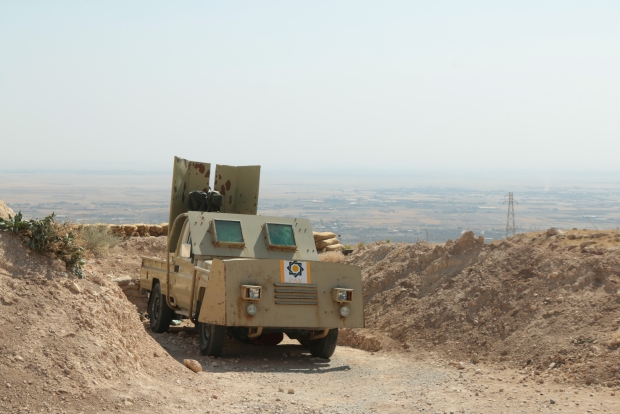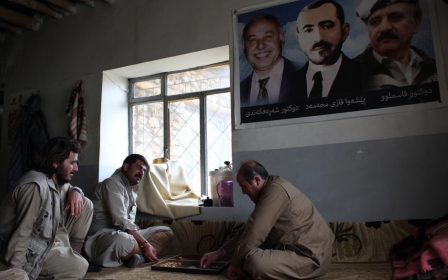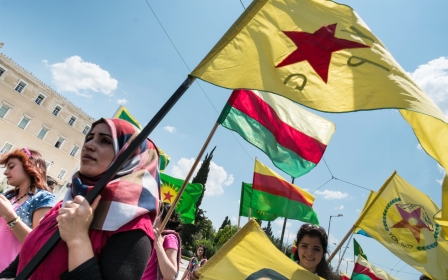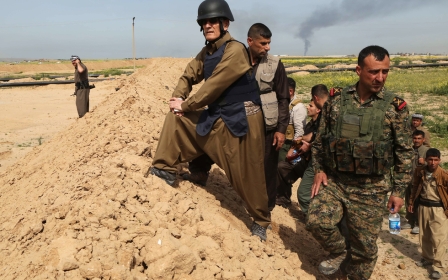Kurds step up attacks as cold war with Iran threatens to spark
ERBIL, Iraq - For a man lucky to be alive, Kheder Pakdaman is remarkably calm. Speaking on a phone from his party's headquarters in the Iraqi town of Koya, the veteran guerilla commander quietly recounts yet another deadly encounter with Iran's armed forces.
On 6 September, Pakdaman was leading a group of Kurdish fighters into the town of Sardasht in western Iran, when gunfire erupted and his unit was pinned down by a hail of bullets.
"The Iranian regime ambushed us when we were in the town to meet our people. We managed to get out of the ambush after heavy fighting," he tells Middle East Eye.
The Kurds, members of the Kurdistan Democratic Party of Iran, or KDPI, had to leave behind the bodies of two dead comrades, and dragged four wounded fighters to safety in their desperate withdrawal back to Iraq. Pakdaman says that six Iranian soldiers died in the clash.
Such lethal skirmishes have become routine for the commander, one of the leading military figures in the KDPI, since the party began sending groups of their fighters into Iran in 2015.
Filtering in over the mountainous border, they have repeatedly clashed with Iran's army and elite Revolutionary Guard units.
The KDPI has been in exile in the autonomous Kurdish region of Iraq since it was driven across the border in the 1980s, and had been largely inactive until recently.
"We are engaged in armed conflict with the Iranian regime because we don't have any other option," Pakdaman says.
"We are willing to put an end to the conflict through dialogue and peaceful means, but the Iranian regime does not respond to peaceful initiatives and insists on depriving the Kurds of their rights."
Spurred on by regional gains
Pro-Kurdish activists say the government in Tehran is systematically discriminating against Kurds and other minorities. Iran's Kurds are deprived of fair representation in politics and suffer from economic neglect, and attempts to stand up for minority rights are met with brutal suppression, they say.
The failure of the reformist government under President Hassan Rouhani to live up to early pledges to improve the situation of the Kurds has stoked discontent, says Taimoor Aliassi, president of the Geneva-based Association for Human Rights in Kurdistan of Iran.
"The inaction of the reformist and moderate administration of the Islamic Republic, including Rouhani’s cabinet, as well as the increased repression against Kurdish people, have pushed Iranian Kurds to rethink their resistance strategy," he says.
Regional Kurdish spring
Another factor stirring unrest in Rojhelat are the changing fortunes of the Kurds in other countries, adds Aliassi.
In Iraq, the Kurdish Regional Government has already gained a large measure of autonomy, and is openly striving for independence. In war-torn Syria, the Kurds have carved out a region in the country's north, which they intend to keep under their control at all cost.
In Turkey, the renewed outbreak of hostilities between the PKK and the government serves as an inspiration for those seeking a military solution to the Kurdish plight in Iran.
The KDPI has come to believe that the time is right for an aggressive push for Kurdish rights.
For a second year running the party sent its troops across the vast mountain ranges that separate Iran and Iraq as soon as the snow-melt in the spring made possible the arduous journey.
Experienced mountaineers, they share the trek with smugglers bringing contraband such as alcohol into the Islamic Republic.
Faced with Iran's formidable armed forces and security apparatus, the KDPI is facing an uphill struggle in its attempt to expand its presence in Iran.
"I would only speak of a pin prick, a quick stab in the Iranian side by a Kurdish group that has been dormant for almost 25 years and has been resuscitated, one suspects, by Iran's rivals in the region. I doubt it has sustained fighting power," says Joost Hiltermann, the MENA programme director at the International Crisis Group.
The party is also in a precarious position, as it relies on the KRG as a base from which to stage its incursions into Iran. Iraq's Kurds are in no mood to anger their powerful neighbour while fighting the Islamic State and seeking independence from Baghdad.
The Patriotic Union of Kurdistan (PUK), the political party that holds sway in the eastern part of the KRG that borders Iran, traditionally has close ties to Tehran.
The KRG has already voiced its disquiet at the KDPI's newfound aggression.
"We do not want KRG territories to be used by any group to threaten the security of our neighbouring countries. This is a very clear stance of KRG and all, with KDPI included, are informed of this," says Jhilwan Qazzaz, a government spokesman.
A new front in an old war
The KDPI is not the only Kurdish opposition movement pushing for change in Iran. Among the most bellicose is the Kurdistan Freedom Party, know by its Kurdish acronym PAK.
The party, which commands the loyalty of hundreds of Peshmerga, rallied to the Kurdish cause when the Islamic State group attacked KRG territory in 2014.
Its fighters are deployed at the front at Kirkuk and near Mosul, where they have held IS at bay for two years.
Overlooking the IS-held town of Bashiqa from his heavily fortified position on a ridge above, the 28-year-old PAK commander Hajir spells out the future for his party.
"When we are finished here, we will go back to Iran because we want to finish the fight," he says behind a wall of sandbags, while his fellow fighters peer through binoculars at an enemy dug in barely 700 metres down the slope.
Hajir's men have repelled 25 IS attacks during their time on the ridge, says the commander. They have killed IS militants in tense night combat, blown up suicide bombers with rocket-propelled grenades, exchanged sniper fire and ducked from incoming mortar fire. The prospect of facing off with Iran's military does not bother them.
Unlike the KDPI, which strives for autonomy for the Kurdish region akin to the KRG in Iraq, the PAK's declared goal is independence.
"The small problems, like not being allowed to read or write in Kurdish, don't concern us. We are fighting because this is our land, and the Iranians can't take over our land. We should have our own country, that's what we are fighting for," says Hajir.
Even though the bulk of PAK fighters are tied down in Iraq, the group has so far launched six attacks against security forces in Iran, a commander told the AP news agency this month.
The PJAK have desisted from its guerilla campaign in Rojhelat in recent years as Iran is propping up the Syrian government of President Bashar al-Assad, which in turn has a de-facto neutrality pact with the PKK-affiliated movement in Syria, says Hiltermann.
The PJAK has channeled its fighters into Rojava, as the Kurdish enclave in Syria is known, where they are gaining valuable combat experience fighting IS.
Should circumstances in Syria change, the PJAK will likely focus its attention back on Iran, adding another battle-hardened group to the insurgency.
"PJAK has been in a virtual truce with Iran since 2012 as a result of a deal between Iran and the PKK in response to the Syria crisis. If revived, PJAK would be a far more potent force than the KDPI," says Hiltermann.
A key military ally in Baghdad's fight against IS and Assad's battle for survival, Iran has managed to keep conflict at its doorstep.
But the repercussions of regional conflict on its unresolved Kurdish question may cause the bloodshed to increasingly spill over into the Islamic Republic.
This article is available in French on Middle East Eye French edition.
New MEE newsletter: Jerusalem Dispatch
Sign up to get the latest insights and analysis on Israel-Palestine, alongside Turkey Unpacked and other MEE newsletters
Middle East Eye delivers independent and unrivalled coverage and analysis of the Middle East, North Africa and beyond. To learn more about republishing this content and the associated fees, please fill out this form. More about MEE can be found here.





